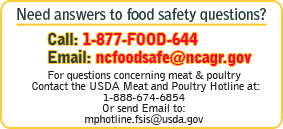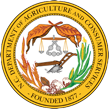State Agency Roles in Food Safety
NCDA&CS Food & Drug Protection Division
Food Manufacturers, Wholesalers, and Retailers
The Food & Drug Protection Division is responsible for the inspection of food manufacturing facilities, wholesale food operations, and retail food outlets including seafood markets. The facilities are inspected utilizing the North Carolina Food, Drug and Cosmetic Act and adopted regulations. Operators of facilities found to be in violation of the Act are subject to civil and/or criminal penalties. Additionally, products found be adulterated or suspected of being adulterated may be placed under State embargo. If during the course of an inspection it is determined through samples or visual observations that adulterated products have been distributed, a public health advisement may be issued by the Department to warn the public of the risk associated with consumption/use of these products.
North Carolina Food, Drug, and Cosmetic Act
The Food, Drug, and Cosmetic Act is the law that provides the framework used to uniformly administer programs designed to assure consumers in North Carolina that foods, drugs, devices, and cosmetics are safe, wholesome, unadulterated, properly labeled, registered, manufactured, stored, and distributed in a manner that ensures their safety and efficacy to consumers and the environment. Foods should be pure and wholesome, safe to eat, and produced under sanitary conditions. Drugs and devices should be safe and effective for their intended uses. Cosmetics must be safe and manufactured from approved ingredients. All food, drug, and cosmetic labels, labeling, and packaging must be truthful, informative, and not deceptive.
Inspections
The Food Branch of the Food and Drug Protection Division protects the health, welfare and economic interests of the state's consumers of foods. This is accomplished through a program of inspection which ensures such products are wholesome and properly labeled. The Division also provides assurance of the quality of automotive antifreezes sold in North Carolina.
Food Regulatory Specialists conduct routine unannounced inspections of food manufacturers, warehouses and distributors to ensure that human foods are safe, wholesome, produced under sanitary conditions, properly labeled, stored, distributed and held under sanitary conditions. Specialists ensure that the Division laws and regulations are adhered to and that products are safe for consumption and use. Assistance is also given to the citizens of this state in establishing new businesses and expanding those presently operating to ensure conformity with governing laws and regulations. Samples are routinely collected for laboratory analysis during inspections and investigations conducted when the Department receives a consumer complaint.
Food Label Review
Food product labels are reviewed for conformance to current labeling regulations. All food products in package form must conform to required label information that includes product name, net weight, ingredient listing, manufacturer/distributor name and address, and nutrition information. Some food product labels may also be required to bear product coding and other statements related to product storage. Food product labels that do not conform to all required labeling regulations may be deemed misbranded.
Product Testing
The Food & Drug Protection Division routinely collects samples for analysis of products produced at facilities under the Department's inspectional purview. Additionally, samples are collected during consumer complaint investigations. Samples are analyzed to determine the presence of certain microorganisms, various chemicals including pesticide residues, heavy metals, foreign material, and other quality defects. Sample results may be used, when necessary, to initiate embargoes of products, recalls, and associated public health advisories
The Food & Drug Protection Division is responsible for the regulatory oversight of milk haulers and testers within the State.
The Food & Drug Protection Division is responsible for the regulatory oversight of wholesale and retail frozen dessert manufacturers operating within the State.
Registration and Licensing
Wholesale and retail frozen dessert manufacturers, cheese and butter manufacturers, milk haulers and testers, and automotive antifreezes are required to be licensed. The license period and specific fees vary.
Commercial Animal Feed and Pet Food Program
The purpose of the North Carolina Commercial Feed Law is to regulate the manufacture and distribution of commercial feed within the state. It provides for annual registration of commercial feed and pet food that is distributed in the state. A state-wide inspection service is maintained for checking feed labeling for compliance with the current Good Manufacturing Practice Regulations and for collecting official samples for analysis. Chemical and microscopic analyses are performed by the Feed Laboratory to insure feed products are safe and effective for their intended purposes. The Farm Feed Forage Testing Service program provides results of analyses on farmer- submitted feed samples so that rations may be balanced for efficient production.
NCDA& CS Meat and Poultry Division
The Meat and Poultry Divisions mission is:- To enforce the North Carolina Compulsory Meat Inspection Laws.
- Enforce the North Carolina Poultry Products Inspection Laws.
- To ensure that meat and poultry plants subject to North Carolina state inspection produce safe, wholesome, and properly labeled meat and poultry products.
- To inspect meat and poultry plant products, practices and conditions and undertake enforcement actions as appropriate.
NCDENR, Dairy and Food Protection Branch
Protects public health through development of standards, review of plans and monitoring of enforcement activities for food handling establishments and lodging establishments. Standards enforced through county health departments include rules governing restaurants, food stands, mobile food units, meat markets, hotels, bed and breakfasts, and summer camps. The Milk Sanitation Program protects the public health by regulating the sanitary production, transportation, processing and distribution of Grade "A" milk and milk products.
The mission of the Food Protection Program is to reduce the risk of food-borne illness and other communicable diseases by ensuring reasonable protection by providing progressive leadership, resources, and education for the promotion of public health, safety and confidence for the people.
NCDHHS, Division of Public Health
The Communicable Disease Branch has four main objectives:
- To promptly investigate disease outbreaks and unusual situations and to implement control measures to minimize further transmission of disease
- To monitor disease-reporting by physicians and laboratories in order to detect trends and to assess the public health impact of diseases
- To provide a channel of communication between public health agencies, private physicians, and hospital and occupational infection control personnel, as an essential part of disease control efforts
- To explain public health interventions and disseminate health education messages to the community and the media in order to enhance disease control efforts
.jpg)


